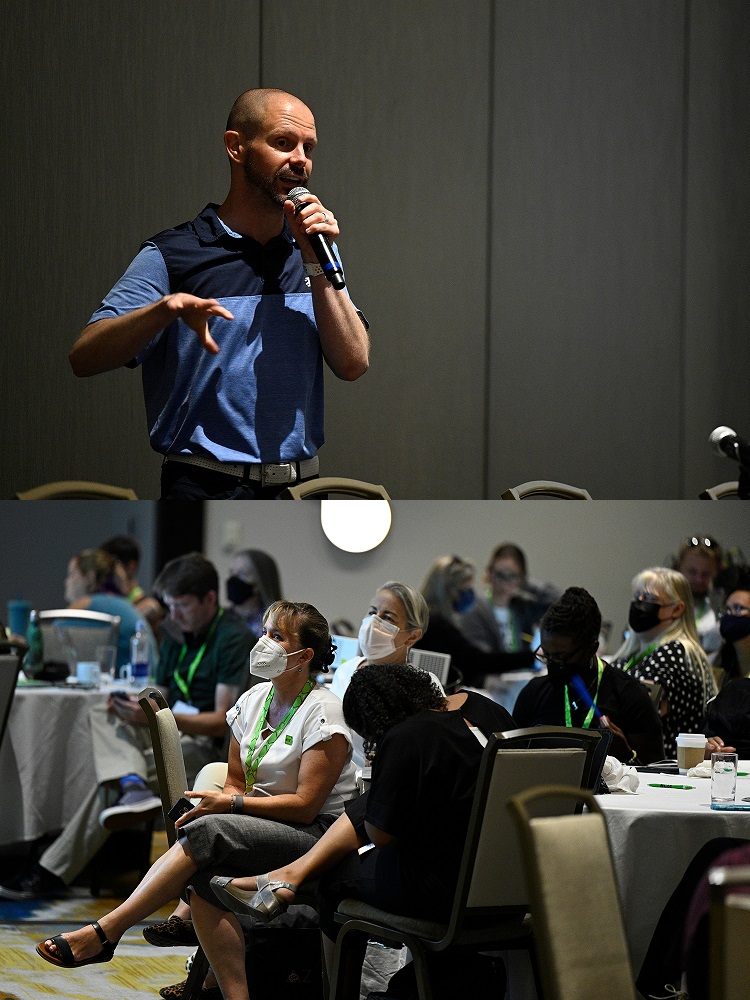This post was written by NCTE member Christopher Bronke.
Anyone who follows me on Twitter, works with me, or has had any sort of conversations with me around leadership knows that I firmly believe that leaders need training: we need the time and space to explore our craft, to share our strategies, and to grow individually and collaboratively. And all too often, at least in the educational space, these same leaders are so often tasked with providing the PD/training to those that they lead, that their own growth gets woefully overlooked. That is why I was thrilled to be given the chance to do some leadership workshop work at the recent NCTE Homecoming event. These sessions provided leaders the opportunities to engage in meaningful conversations, share with one another, and grow their practice. When I think back on this work, one personal reflection stands out the most: leaders can create their own PD.
Sure, being able to attend these sorts of sessions are a fantastic opportunity for leaders to grow. And sure, districts should do more to provide their leaders with the sort of PD that will push their practice. However, presenting at Homecoming helped me learn that simply preparing to deliver leadership workshops was probably the best leadership PD I could have asked for.
Preparing for these sessions forced me to think about my beliefs, to codify my thinking and practices, and to hold a mirror up to my own practice. I had to ask myself honestly if there was anything in my own practice really worth sharing (and I was hoping there was), but to answer that question, I had to really reflect on what I believe as a leader, what I actually do as a leader, and if any of that even matters or works. I had to self-analyze my practice in ways that were new and uncomfortable, interesting, and enlightening. The act of trying to extrapolate tangible suggestions and meaningful sharings pushed my thinking in extremely rewarding ways. It illuminated strengths worth sharing but also gaps that need addressing. In some respects, it forced me to critically examine places where my leadership is lacking and to come up with improvements worth sharing.
So, what did I learn from this work? Here are a few key takeaways:
- Leadership isn’t as hard as it seems if we are deliberate and intentional with our planning. But the time constraints on leaders makes that a big “if” all too often.
- Protocols matter. Leaders cannot take for granted our role in developing and selecting the right protocol based on the purpose of the meeting. We cannot just assume teachers will engage in the ways we want them to if we don’t create the conditions and processes for that engagement.
- Leaders need more exposure to protocols and/or practice and experience in creating them. See above …
- Kindness matters, a lot. Now that said, being kind is not a synonym for avoiding hard conversations or not holding those we lead accountable; however, it is a value that should permeate all we do.
- Leadership should be fun! That doesn’t mean it is easy or stress free; this doesn’t mean that there won’t be tears and tribulations. But leadership provides us a pathway to maintain the humanity in the work, and the joy of the journey is meaningful, worthwhile, and a labor of love. Those things should be fun.
So, if you are looking for leadership training, searching for ways to improve your practice, consider leveraging your own leadership for the sake of learning. It’s free. You can do it on your own time. And you can decide if your insights are worth sharing, but (spoiler alert) they will be!
It is the policy of NCTE in all publications, including the Literacy & NCTE blog, to provide a forum for the open discussion of ideas concerning the content and the teaching of English and the language arts. Publicity accorded to any particular point of view does not imply endorsement by the Executive Committee, the Board of Directors, the staff, or the membership at large, except in announcements of policy, where such endorsement is clearly specified.
 As a practicing English teacher and department chair at Downers Grove North in Illinois, Christopher Bronke is incredibly passionate about supporting others in their learning. After seventeen years in education, Bronke has held numerous teacher leadership positions at the national level including a seat on the Teacher Advisory Council for the Bill and Melinda Gates Foundation, and currently serves as the Chair for the Conference on English Leadership which also has him serving on the Executive Committee for the National Council of Teachers of English. Bronke earned an MA in Teaching and Learning, Educational Leadership, an EdS in Educational Leadership, and is working on an EdD from Northern Illinois University in the field of educational leadership, with a dissertation focus on standards-based learning/assessing.
As a practicing English teacher and department chair at Downers Grove North in Illinois, Christopher Bronke is incredibly passionate about supporting others in their learning. After seventeen years in education, Bronke has held numerous teacher leadership positions at the national level including a seat on the Teacher Advisory Council for the Bill and Melinda Gates Foundation, and currently serves as the Chair for the Conference on English Leadership which also has him serving on the Executive Committee for the National Council of Teachers of English. Bronke earned an MA in Teaching and Learning, Educational Leadership, an EdS in Educational Leadership, and is working on an EdD from Northern Illinois University in the field of educational leadership, with a dissertation focus on standards-based learning/assessing.

